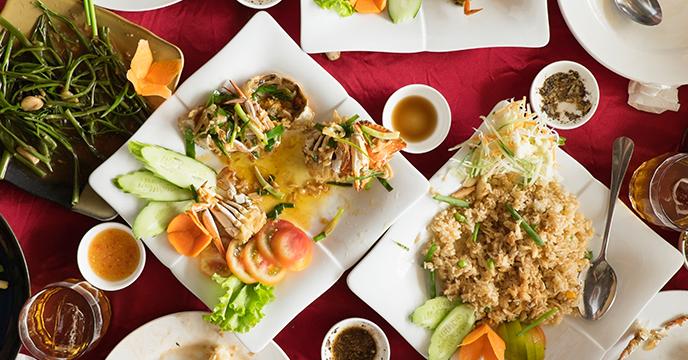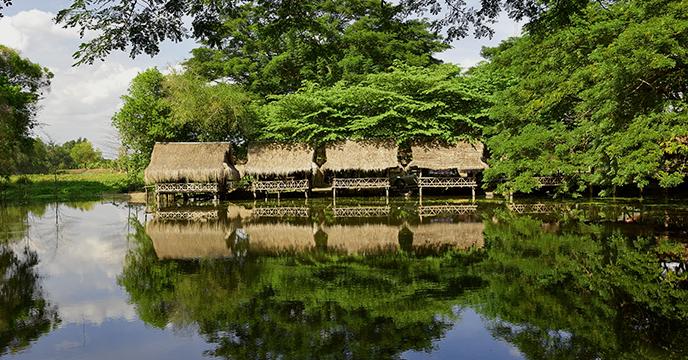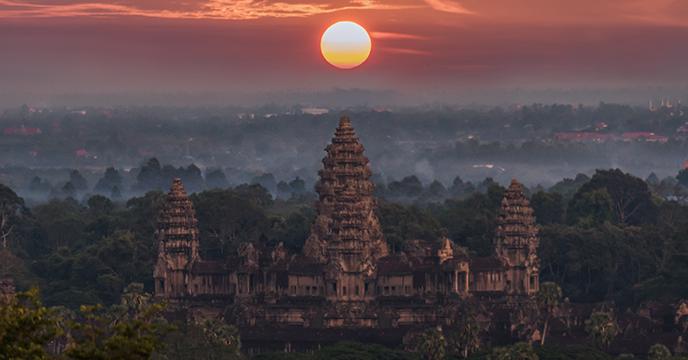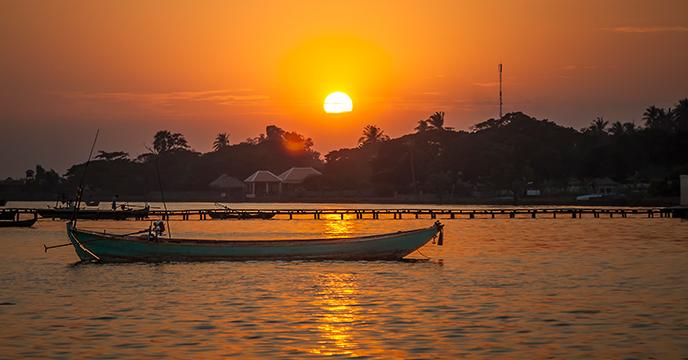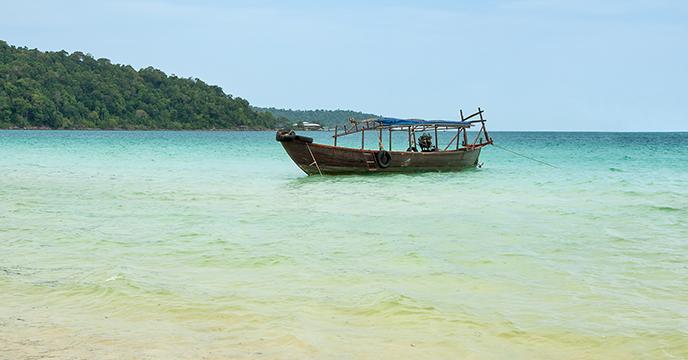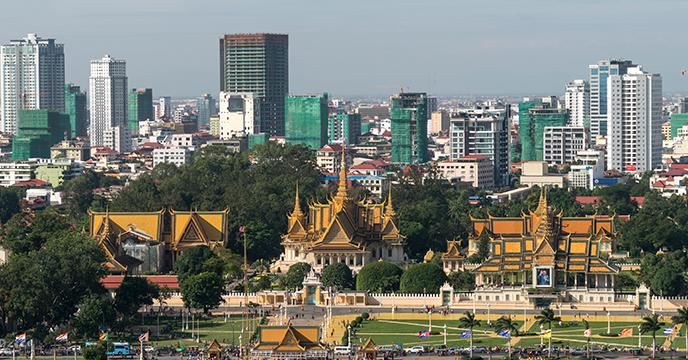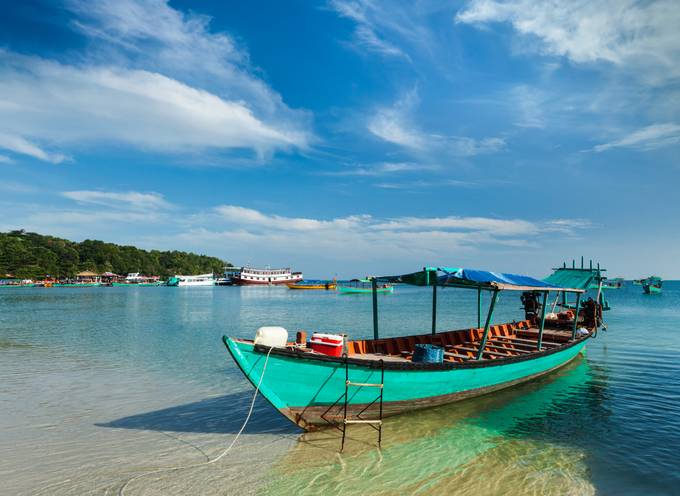
Cambodia Travel Guide
It’s time to talk about Cambodia. If it's not already at the top of your must-visit list then you might have some rearranging to do. Embrace the heart-stealing scenery of this Southeast Asian nation as you roam through lively markets, majestic temples and charismatic towns that seem untouched by modern tourism developments. It’s time to delve a little bit deeper and get acquainted with Cambodia.
The Highlights
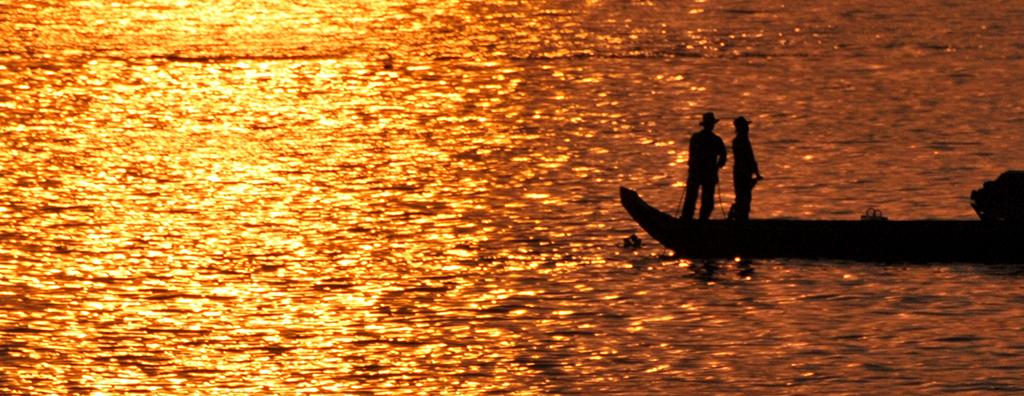

The Basics
The Location
Cambodia is located in Southeast Asia and shares borders with the Gulf of Thailand, Vietnam, Laos and Thailand. From Dubai, a non-stop flight is 8h 30m, and from Sydney, it is roughly 11h 30m, with a stopover.
Capital City
Phnom Penh is the vibrant bustling capital of Cambodia and is also the most populous city in the country.
Main Airport
Phnom Penh International Airport is the largest airport in Cambodia containing a land area of 400 hectares. It is located 10 kilometres from the city of Phnom Penh.
- Code
- PNH
- Closest City
- Phnom Penh
Language Spoken
The official language of Cambodia is Khmer, and English is also widely spoken, particularly in tourist hot spots.
Currency
Cambodia uses the Cambodian Riel. The currency code is KHR. ATMs are widely available and credit cards are accepted by many hotels and restaurants across Cambodia.
Visas
Most visitors to Cambodia will be granted a one-month visa on arrival for a small fee of USD $30 and you will need to have a passport sized photo on hand. We recommend checking your country's travel advisories in advance of booking a trip.
Electricity
Electrical current is 230V/50hz using three associated plug types, A, C and G. The standard voltage in the US is 110 volts, so you may need a surge adaptor.
Vaccinations
Typhoid, Hepatitis A and B are advised however there are no compulsory vaccinations. Consult your doctor 6 to 8 weeks before you depart.
Emergency Calls
The phone numbers to call in case of emergency when in Cambodia are 117 for the police, 119 for an ambulance and 118 for a fire.
When to Visit

Cambodia Tours

Visit Responsibly
Travelling responsibly means respecting the communities, culture and environment of the places you visit. Keep these tips in mind when travelling to Cambodia:
Go green. Be environmentally conscious on the road by taking short showers; turning off the lights in your hotel room when you leave; and resisting the urge to collect any plants, seashells, or other natural flora.
Respect cultural differences. Before travelling, read about the local culture and customs – even just knowing the dress code and a few basic phrases in the local language will go a long way.
Support local businesses. Enjoy a more authentic experience and directly support the local economy by travelling with a local guide, eating in local restaurants, buying from local artisans, and staying in locally-owned and operated accommodations.
Wherever possible, avoid single-use plastics. Pack reusable items such as your own shopping bags, utensils, a water bottle, and a straw. These items are typically lightweight and compact, and will greatly reduce your consumption of plastics.
Be conscious of overtourism. Opt to visit the lesser-known regions of Cambodia or travel outside the peak season – you'll likely even get a better deal and won't have all the crowds!
Sustainable Tourism in Cambodia
Sustainable Cambodia
Sustainable Cambodia is an organization dedicated to helping families of rural Cambodia achieve a sustainable and self-sufficient quality of life via the installation of wells, irrigation systems, quality education for the children, sustainable incomes, and healthy food. The local families learn about a variety of topics: alternative agriculture, the installation of wells, and how to manage community projects and build schools.
Cambodia’s Sustainable Development Goals (SDGs)
After endorsing the 17 global SDGs in 2015, the Royal Government of Cambodia adapted the goals to fit their national context and devised a fully localized framework called the Cambodian SDGs (CSDGs). They also added an eighteenth goal which requires the clearance of landmines and unexploded ordnance.
Sustainable Tourism Initiatives
Siem Reap has a number of businesses dedicated to supporting the local community and conserving the environment. Not only do these businesses encourage sustainable tourism, but they also actively help the Cambodian people in need by creating better opportunities within the community. Made in Cambodia Market, Rehash Trash, and the Café Collective are just a few examples.
FAQs about Cambodia
Do you tip in Cambodia?
There isn’t much of a tipping culture in Cambodia, but it is recommended to leave a tip of 10% in a restaurant to show gratitude for good service and this will of course, always be appreciated.
What is the internet access like?
Internet connection can range in quality, but you should have no problem with day-to-day tasks like emailing or surfing the web while in Cambodia. WiFi is available in many cafes, hostels and hotels for free, but outside urban areas, this is not as common.
Is the tap water safe to drink?
Definitely not. Bottled water is available all over the country, even in the most remote parts. Just make sure the seal is still on and unbroken.
Can I use my credit cards?
Yes, credit cards are widely accepted throughout Cambodia. Please check with your bank about any foreign transaction charges.
What are the public holidays?
Some of the major public holidays in Cambodia include New Year’s Day on January 1, Victory Over Genocide on January 7, King’s Birthday on May 13-15, Constitution Day on September 24 and Independence Day on November 9 among others.
Is it safe to travel in Cambodia solo as a female?
Definitely! Cambodia is a welcoming and friendly place where solo female travellers should feel comfortable. As always, small precautions like keeping your bag close to you in the city will help to keep you out of trouble.
